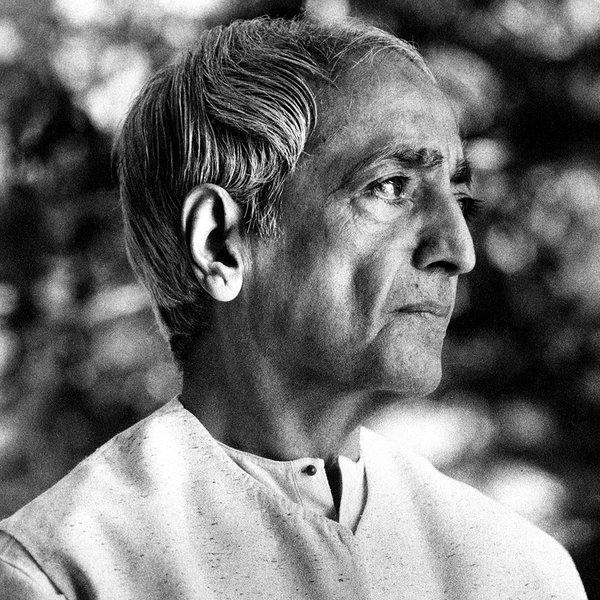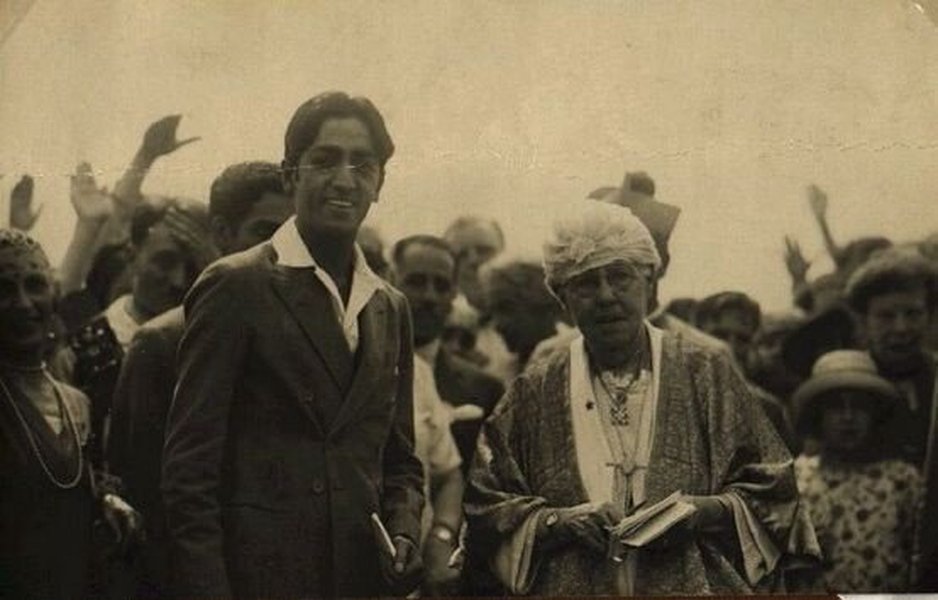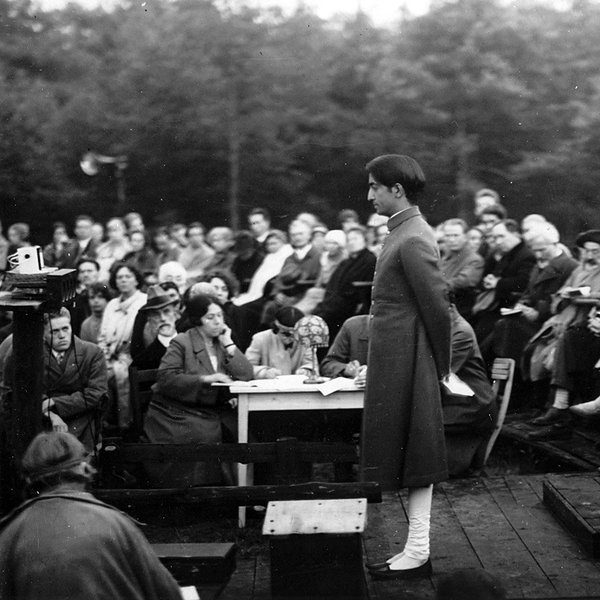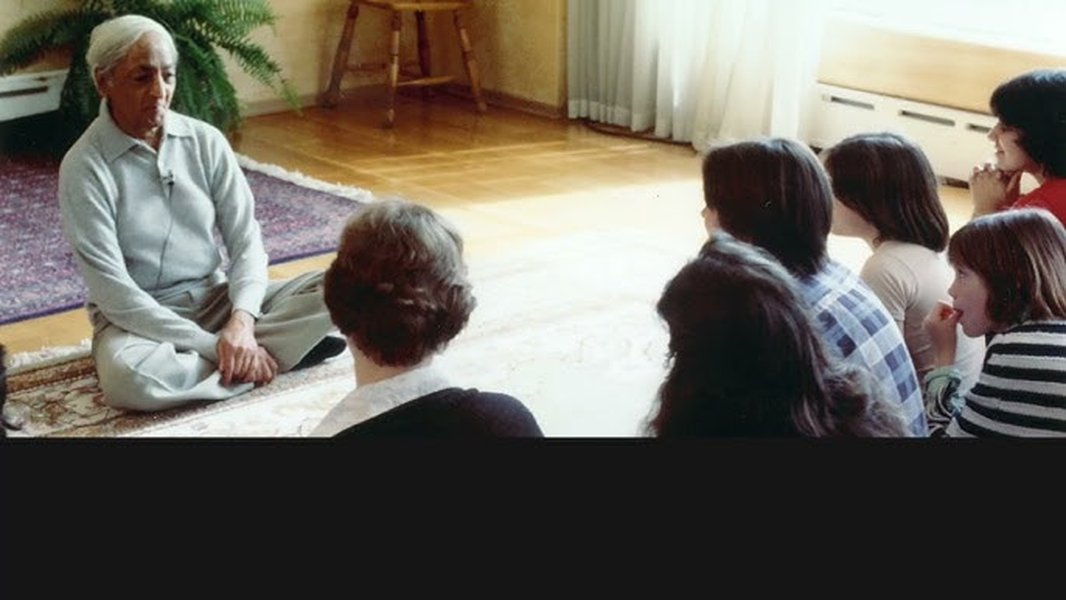| title: | Ithy Jiddu | |||||
|---|---|---|---|---|---|---|
| date: | 2024-04-01T00:00:00.000Z | |||||
| tags: |
|
Discover the profound understandings of a philosopher who challenged humanity to break free from all conditioning.

Jiddu Krishnamurti, a philosopher whose teachings emphasized direct perception and freedom.
- Truth is a Pathless Land: Krishnamurti fundamentally rejected the idea that truth could be found through any organized religion, dogma, guru, or prescribed method. It must be discovered individually.
- Freedom from All Conditioning: He stressed the urgent need for humanity to become aware of and break free from deep-seated psychological conditioning imposed by society, culture, and personal history.
- The Power of Choiceless Awareness: True understanding arises not from analysis or judgment, but from passive, attentive observation of one's own mind and the world as it is.

Krishnamurti (right) during his early years with his mentor Annie Besant (left), a key figure in the Theosophical Society.
Krishnamurti was extensively groomed for this messianic role, and an international organization, the Order of the Star in the East, was established to support his anticipated mission. However, in a stunning turn of events in 1929, Krishnamurti publicly renounced the World Teacher mantle and dissolved the Order. He declared that truth could not be organized or approached through any authority, including himself. This pivotal moment marked the beginning of his independent journey, traveling the world for over half a century, giving public talks and engaging in dialogues, urging individuals towards self-understanding and unconditional freedom.
This famous statement, delivered during his 1929 speech dissolving the Order of the Star, forms the bedrock of Krishnamurti's entire philosophical outlook. He asserted profoundly:
"I maintain that Truth is a pathless land, and you cannot approach it by any path whatsoever, by any religion, by any sect... Truth, being limitless, unconditioned, unapproachable by any path whatsoever, cannot be organized; nor should any organization be formed to lead or coerce people along any particular path."
This understanding implies several critical points:
- Rejection of Organized Paths: Truth cannot be contained within or accessed through any established system – be it religious, political, or philosophical. Creeds, dogmas, rituals, and scriptures are seen as potential hindrances, constructs of thought that limit direct perception.
- Individual Discovery: The responsibility for discovering truth lies solely with the individual. It requires personal insight, observation, and understanding, not adherence to external dictates.
- Immediacy of Truth: Truth is not a distant goal to be achieved through time or practice, but a living reality to be perceived in the present moment, free from the distortions of the past or projections of the future.

A visual representation related to Krishnamurti's historic 1929 speech where he declared "Truth is a pathless land."
Krishnamurti relentlessly pointed out that the human mind is deeply conditioned. This conditioning stems from various sources:
- Society and Culture: Traditions, social norms, nationalistic identities, and collective beliefs shape our perceptions and responses.
- Religion: Organized religions impose specific beliefs, dogmas, and rituals that limit inquiry.
- Personal Experience: Past hurts, pleasures, fears, and knowledge create a filter through which we view the present, preventing fresh perception.
- Education: Conventional education systems often emphasize conformity and knowledge accumulation over critical thinking and self-awareness.
He argued that this conditioning is the root cause of inner and outer conflict, fear, division, and suffering. It prevents individuals from seeing reality clearly and acting intelligently. Freedom, therefore, begins with becoming aware of this conditioning without judgment or resistance.
Stemming from his "pathless land" insight, Krishnamurti vehemently rejected all forms of psychological authority. This includes gurus, spiritual leaders, sacred texts, traditions, and even his own words if taken as dogma rather than pointers for self-inquiry. He believed that reliance on external authority cripples the individual's capacity for direct understanding and fosters dependency, preventing true freedom. He urged listeners to be "a light unto themselves," to question everything, and to discover truth through their own investigation.
Central to Krishnamurti's approach is the practice of "choiceless awareness." This is not a technique or method but a state of alert, passive observation of one's inner and outer world without any motive, judgment, comparison, or desire to change what is observed. It involves seeing thoughts, emotions, reactions, and the movements of the self exactly as they are. He suggested that in this clear, unbiased seeing, without the interference of the conditioned mind, understanding and transformation can arise naturally.
Krishnamurti frequently explored the idea that the division we perceive between the "observer" (the 'I', the thinker, the self) and the "observed" (the thought, the feeling, the object) is an illusion created by thought itself. He stated, "The observer is the observed." When one realizes this non-duality, the internal conflict inherent in trying to control or change oneself ceases. The energy previously consumed by this internal struggle is liberated, allowing for a different quality of attention and action.
Krishnamurti saw relationships – not just intimate ones, but all interactions with people, nature, and ideas – as crucial opportunities for self-discovery. He proposed that our reactions, judgments, fears, and attachments in relationships act like mirrors, reflecting the content of our own consciousness. By observing ourselves honestly within the context of relationship, without blame or justification, we can gain profound insights into the workings of our own minds and the nature of the self (ego).
This mindmap provides a visual overview of the interconnectedness of Jiddu Krishnamurti's primary teachings, branching out from the central theme of liberation through self-understanding.
mindmap root["Jiddu Krishnamurti's Understandings"] id1["Core Principles"] id1a["Truth is a Pathless Land"] id1b["Absolute Freedom"] id1b1["From Conditioning"] id1b2["From Authority"] id1b3["From Fear"] id2["Key Concepts"] id2a["Self-Observation"] id2a1["Choiceless Awareness"] id2a2["Observer is the Observed"] id2b["Conditioning"] id2b1["Societal / Cultural"] id2b2["Religious"] id2b3["Psychological (Past)"] id2c["Thought & Time"] id2c1["Limitations of Thought"] id2c2["Psychological Time"] id2c3["Living in the Now"] id2d["Mind & Consciousness"] id3["Implications & Applications"] id3a["Relationships as Mirrors"] id3b["Education for Freedom"] id3c["Inner Revolution"] id3d["Love & Compassion"] id3e["Meditation as Awareness"]
Krishnamurti recognized the necessity of thought for practical, technical matters but pointed out its severe limitations in the psychological realm. He described thought as being inherently based on the past – on memory, experience, and accumulated knowledge. As such, thought is always fragmented, limited, and old. It cannot grasp the totality or newness of life. Relying solely on thought to solve psychological problems like fear or conflict is futile, as thought itself is often part of the problem.
He distinguished between chronological time (time by the clock) and psychological time (the mind's dwelling on the past or projecting into the future). Krishnamurti considered psychological time a primary source of human suffering. Living in memories (regret, resentment) or future projections (hope, fear, becoming) prevents us from engaging fully and directly with the reality of the present moment – the only time where true perception and action are possible. Thought creates psychological time, trapping the mind in a continuous cycle of becoming, rather than simply *being*.
The alternative to operating solely through thought and psychological time is direct perception. This involves seeing things as they are, in the present moment, without the screen of past experiences, conclusions, or future expectations. This state of direct perception, born of choiceless awareness, allows for insight – a flash of understanding that is not the product of linear thinking but arises from a quiet, attentive mind.
This chart visually contrasts key aspects of Jiddu Krishnamurti's philosophical approach against what might be considered more 'Traditional Spiritual Paths'. The data represents a qualitative assessment based on his teachings, highlighting the radical nature of his perspective. Note that 'Traditional Spiritual Paths' is a broad generalization used here for comparative purposes.
As the chart illustrates, Krishnamurti placed exceptionally high emphasis on individual discovery, rejection of dogma, self-awareness, critique of thought, and the immediacy of freedom, while radically minimizing the role of authority, tradition, and structured methods, contrasting sharply with many established spiritual traditions.
For Krishnamurti, qualities like love, compassion, and intelligence were not things to be cultivated or achieved through effort, discipline, or belief. He saw them as the natural flowering of a mind free from conflict and conditioning. Love, in his view, is not sentimentality, attachment, or pleasure-seeking – these are products of the self. True love arises only when the self, with its fears, desires, and possessiveness, is absent. Similarly, compassion is not pity or sympathy but an inherent sensitivity to all of life that emerges from deep understanding and interconnectedness. Intelligence, for Krishnamurti, was not mere intellect or cleverness, but the capacity to perceive directly and act appropriately from a state of holistic awareness, unburdened by fragmentation and prejudice.
Krishnamurti dedicated significant attention to education, believing conventional systems often perpetuated societal conditioning rather than liberating the human mind. He founded several schools around the world (in India, England, and the USA) based on his philosophical principles. His vision for education aimed at:
- Holistic Development: Cultivating the whole human being – intellectually, emotionally, physically, and psychologically.
- Fostering Freedom: Helping students understand and free themselves from conditioning, fear, and the pursuit of comparison and competition.
- Nurturing Intelligence: Encouraging sensitivity, awareness, critical inquiry, and the capacity for direct perception, rather than just rote learning or knowledge accumulation.
- Understanding Relationship: Guiding students to understand their relationship with others, with nature, and with society as a whole.
- The Right Role of the Educator: Teachers were seen not as authorities imparting knowledge, but as facilitators helping students to learn about themselves and the world through dialogue and inquiry.
The goal was not merely academic excellence but the emergence of mature, sensitive, intelligent human beings capable of living peacefully and creatively in a complex world.

Krishnamurti engaging in discussion, reflecting his emphasis on dialogue and inquiry in education.
This table summarizes some core aspects of Krishnamurti's understanding in contrast to generalized traditional spiritual or philosophical approaches, highlighting the uniqueness of his perspective.
| Concept | Krishnamurti's Understanding | Traditional Approach (Generalized Contrast) |
|---|---|---|
| Path to Truth | Pathless; individual discovery through direct perception and self-awareness. Rejects organized systems. | Often involves prescribed paths, doctrines, rituals, techniques, lineage, or guru guidance. |
| Role of Authority/Teacher | Rejects all psychological authority; encourages being one's own light. Teacher as facilitator of inquiry. | Often relies on gurus, masters, scriptures, or tradition as authoritative sources of knowledge and guidance. |
| Nature of Meditation | Choiceless awareness in daily life; seeing 'what is' without distortion. Not a technique or practice. | Often involves specific techniques, concentration practices, postures, or scheduled sessions. |
| Goal of Education | Cultivating free, intelligent, sensitive minds; understanding self and life holistically. Liberation from conditioning. | Often focuses on knowledge acquisition, skill development, societal integration, or adherence to specific values/beliefs. |
| Source of Suffering | Psychological conditioning, identification with thought, illusion of the separate self, psychological time. | May attribute suffering to karma, desire, ignorance, sin, external forces, or lack of adherence to doctrine. |
| Transformation | Radical, immediate possibility through seeing 'what is'; not a gradual process of becoming. | Often viewed as a gradual path of purification, accumulation of merit, or step-by-step development towards a future goal. |
This video provides a concise summary of the central themes in Jiddu Krishnamurti's philosophy, particularly his assertion that "truth is a pathless land" and the implications this has for seeking understanding and freedom without relying on external authorities or systems.
Ultimately, Krishnamurti's teachings were a call for a radical inner revolution – a complete transformation of human consciousness. He believed that societal problems – war, division, exploitation, environmental destruction – were outward manifestations of the inner state of humanity: our conditioning, fear, fragmentation, and pursuit of self-interest. Therefore, lasting change in the world could only come about through a fundamental change within the individual. This wasn't about conforming to a new pattern but about seeing through all patterns. He insisted that this transformation was not a gradual process or a future ideal but something possible in the immediate present, through the simple yet profound act of unbiased self-observation. Understanding oneself, he argued, is the beginning of wisdom and the key to resolving conflict, both personal and global.
Did Krishnamurti advocate any specific meditation techniques?
No, Krishnamurti generally rejected prescribed meditation techniques or systems. He felt that techniques, while potentially producing certain experiences or temporary quietude, were still activities of the conditioned mind and could become another form of habit or escape. Instead, he emphasized "meditation" as a state of total attention or "choiceless awareness" in the midst of daily life – observing one's thoughts, feelings, and surroundings without judgment or intention. It's the awareness itself, not a method to achieve it, that he pointed to.
What did Krishnamurti mean by "the observer is the observed"?
This is a core insight in Krishnamurti's teachings. He pointed out that we typically experience ourselves as a separate "observer" (the 'I', the thinker, the self) looking at or experiencing something separate – the "observed" (a thought, an emotion like anger, a tree). Krishnamurti argued that this separation is an illusion created by thought. The 'thinker' *is* the thought; the 'experiencer' *is* the experience. Anger is not separate from the 'me' who feels angry; the anger *is* part of the 'me'. When this division collapses through direct perception, the inner conflict of trying to control or suppress the observed diminishes, leading to a different quality of understanding and freedom.
Why did Krishnamurti reject the role of "World Teacher"?
Krishnamurti rejected the "World Teacher" role, for which he was groomed by the Theosophical Society, precisely because it represented the kind of spiritual authority he came to fundamentally oppose. His core understanding was that "Truth is a pathless land" and cannot be approached through any intermediary, organization, or belief system. Accepting the role would have contradicted this insight, creating followers and establishing another structure that he believed would inevitably hinder individuals from discovering truth for themselves. He dissolved the Order of the Star created for him to emphasize the need for individual freedom and direct inquiry, free from any guru or dogma.
How did Krishnamurti view relationships?
Krishnamurti viewed relationships as fundamentally important mirrors for self-understanding. He taught that our interactions with others inevitably reveal our own conditioning, fears, attachments, desires, and conflicts. By observing our reactions (like jealousy, anger, possessiveness, dependency) within relationships without judgment or escape, we can learn directly about the nature of our own minds and the structure of the self (ego). He believed that understanding oneself in relationship was essential, as "all life is relationship." True relationship, free from the images and demands of the self, could only arise from this deep self-awareness.
What was Krishnamurti's perspective on education?
Krishnamurti had a distinct and radical view on education. He felt its true purpose was not merely to impart knowledge or prepare individuals for a career within the existing societal structure, but to cultivate total human beings – free, intelligent, sensitive, and capable of understanding themselves and the world. He advocated for an education that helps students become aware of their own conditioning, encourages inquiry rather than conformity, fosters a love of learning, nurtures sensitivity to nature and others, and addresses the whole psychological life of the child, not just the intellect. He founded several schools to implement these ideas, aiming to create environments where both students and educators could explore the nature of freedom and intelligence together.
- J. Krishnamurti Official Website - jkrishnamurti.org
- Core of the Teachings - Krishnamurti Foundation Trust
- Introduction to the Teachings - Krishnamurti Foundation of America
- Jiddu Krishnamurti - Wikipedia
- Mind and Consciousness as per J. Krishnamurti - PMC NCBI
- J Krishnamurti Teachings & Philosophy - Inner Spiritual Awakening
- Introduction to Krishnamurti 2024 - Krishnamurti Centre
- [Explore Krishnamurti's concept of freedom from the known and its relation to thought.](/?query=What did Krishnamurti mean by freedom from the known?)
- [Discover the connection between Krishnamurti's insights and quantum physicist David Bohm's ideas on reality.](/?query=How did Jiddu Krishnamurti's dialogues with David Bohm bridge philosophy and physics?)
- [Learn how Krishnamurti suggested applying choiceless awareness to everyday situations and relationships.](/?query=What are the practical applications of Krishnamurti's teachings in daily life?)
- [Analyze the similarities and differences between Krishnamurti's unique perspective and other non-dual philosophies.](/?query=Compare Jiddu Krishnamurti's philosophy with other major spiritual traditions like Buddhism or Advaita Vedanta.)
Last updated April 16, 2025
